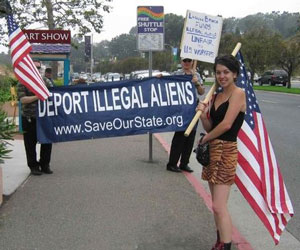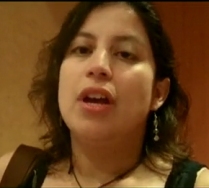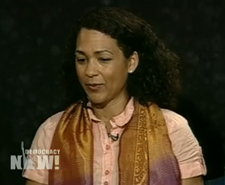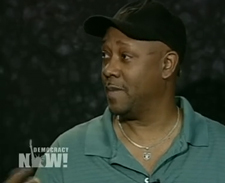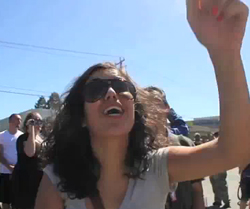We Remember Ronald Reagan, the Father of Crack and a Supporter of Apartheid
by Davey D
 So yesterday Governor Arnold Schwarzenegger strolled into Simi Valley and with the stroke of a pen he made February 6th Ronald Reagan Day. He also vetoed a bill that would allow Farm Workers to be paid overtime. I found it interesting but not all that surprising that we would have that sort of coupling. After all, we’re honoring a man who was all about exploitation and sadly that trait was underscored with a veto. But let’s not digress..
So yesterday Governor Arnold Schwarzenegger strolled into Simi Valley and with the stroke of a pen he made February 6th Ronald Reagan Day. He also vetoed a bill that would allow Farm Workers to be paid overtime. I found it interesting but not all that surprising that we would have that sort of coupling. After all, we’re honoring a man who was all about exploitation and sadly that trait was underscored with a veto. But let’s not digress..
Governor Schwarzenegger said we need to use Feb 6th as a day to teach school kids about the great accomplishments of Ronald Wilson Reagan. He said we need to teach the kids about this man’s legacy.I guess he feels kids should grow up to be like Reagan. I had to laugh because there’s so much to say and its hard to know where to begin.
Should we start by reminding the kids how Reagan ignored the AIDs epidemic that sprung up during his two terms? I contrast Reagan’s ignoring of HIV and AIDs when people suffering from the then unknown disease were begging for help with how we went all out for the Swine Flu. Ronnie was out to lunch on that crises.
Maybe I should teach the kids about how he insisted that ketchup and relish were vegetables as he aggressively fought to push inner city school lunch programs to cut cooked and fresh vegetables from their menus.
I could always teach the kids about Reagan’s trickle down economic theory where he fought to allow rich corporations and businesses to cut taxes which would allow them to create new jobs thus benefitting the masses. I guess I should also teach the kids how many of those rich folks who got those tax breaks promptly took their American jobs overseas where they continued to enjoy tax breaks while our economy was turned upside down..
I’ll be sure to teach the kids how Reagan opposed the Equal Rights Amendment even though women at that time and even today still make less than men.
We could also talk about how he was vehemently opposed to the Black Panthers and pushed for the Mulford Act which was specifically designed to target and disarm them
The Father of Crack
 I guess because so many kids are enamored with rap star Rick Ross, perhaps I could use his popularity as a teachable moment. I could start by letting kids know that Ross the rapper from Miami derived his name from Freeway Rick the drug dealer out of Los Angeles.
I guess because so many kids are enamored with rap star Rick Ross, perhaps I could use his popularity as a teachable moment. I could start by letting kids know that Ross the rapper from Miami derived his name from Freeway Rick the drug dealer out of Los Angeles.
Freeway Rick who has been touring the country lecturing against the harmful impact of drugs is erroneously called the Father of Crack. His South Central operations is legendary as he’s reported to have moved up to 3 million dollars worth of product a week, but that’s only part of the story. Freeway Rick was not the Father but the proverbial God son.. The real Father of Crack was Ronald Reagan, the 40th President of the United States. The man we came to affectionately call the ‘Great Communicator‘.
You see Freeway Rick was allowed to flourish because our government at the time had some dirty war business they wanted to conduct and found it difficult to circumvent the law and limits set up by Congress. Freeway Rick was able to lavish the hood with tons of crack cocaine because of little scheme we came to know as the Iran Contra Scandal . It was the biggest scandal this country had ever known. Even bigger than Richard Nixon’s Watergate.
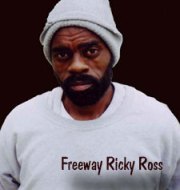 To sum it up what you had was in the early 80s, the US was beefing with Iran and the US was beefing with left leaning factions in Nicaragua called the Sandinistas. Reagan and his boys wanted to knock off the Sandinistas because they didn’t like their politics and the populus movement they represented. Latin America was on the rise and overthrowing dictators who were backed by the US. Reagan wanted to overthrow the Sandinistas by arming a bunch of CIA backed rebels called the Contras. Since we’re supposed to be Freedom Loving country we couldn’t do our bidding publicly, and as I noted Congress wasnt with the program, so Reagan’s senior advisors launched a secret war.
To sum it up what you had was in the early 80s, the US was beefing with Iran and the US was beefing with left leaning factions in Nicaragua called the Sandinistas. Reagan and his boys wanted to knock off the Sandinistas because they didn’t like their politics and the populus movement they represented. Latin America was on the rise and overthrowing dictators who were backed by the US. Reagan wanted to overthrow the Sandinistas by arming a bunch of CIA backed rebels called the Contras. Since we’re supposed to be Freedom Loving country we couldn’t do our bidding publicly, and as I noted Congress wasnt with the program, so Reagan’s senior advisors launched a secret war.
What they did was covertly sell arms to Iran and take the money and use it to fund Contra operations in Nicaragua. Additional money was netted for the Contras through the sale of crack cocaine which suddenly overnight gained huge popularity in hoods throughout the country. Freeway Rick and South Central, LA was ground zero.
LAs notorious gangs became the main traffickers who spread all out the country with Freeway Rick being the kingpen. Some of this is out lined in Ice Cube’s song ‘Summer Vacation‘.
Freeway Rick’s connection to all the cocaine was a notorious drug supplier named Oscar Danilo Blandón who worked with the CIA and was a key link to the Contras. This is where the whole CIA-Crack connection story emerged . They were outlined in the explosive 1996 San Jose Mercury expose and book called Dark Alliances written by the late Gary Webb.
When all was said and done damn near all of Reagan’s senior advisors were convicted, like National Security Council member Oliver North who played a central role and was later pardoned. Reagan the Great Communicator was protected with folks saying he had no idea all this was happening on his watch. The exact term used was Reagan was ‘disengaged’
Supporter of Apartheid
Thats an interesting term because it’s in opposition to what Ronald Reagan prided himself on. Here was a guy who supported South Africa’s Apartheid Regime. He aggressively opposed Nelson Mandela who was in jail as a political prisoner during Reagan’s presidency. Reagan called Mandela and his and the African National Congress a ‘terrorist organization‘.
During the early 80s, worldwide resistance to South Africa emerged including a call from the UN to have an embargo. Recording artists all over the world launched a boycott to Sun City which was a popular resort in South Africa where some of the Apartheid laws were relaxed.
Ronald Reagan along with Israel and Great Britain opposed all of it. Reagan said he supported South Africa because they stood alongside us during all our wars.. He said the best way to get rid of Apartheid was not through embargos but through this term he coined called ‘Constructive engagement‘. When he first used it left everyone stunned and asking WTF? There was nothing to engage. People were calling for an end to the brutal Apartheid regime and Reagan was opposing it. It was so bad that after he vetoed sanctions, Congress did a rare thing and over rode his veto. This man who supposedly loved freedom was on the wrong side of history when it came to making sure it was a reality for Black South Africans. It’s no wonder Nelson Mandela didn’t attend his funeral in 2004.
We can go on and on when talking about Ronald Reagan. He was a hero for those who yearned for the days when many people in marginalized communities were behind the 8 ball not in front of it. Yes when February 6th rolls around.. I will say Happy Ronald Reagan Day and commence to undo the revisionist history the power elite in this country have spent years constructing. I’ll leave with two musical heros who went in hard on Reagan back in the days. Gil Scott Heron with the song B-Movie and Melle-Mel with his song Jesse.
http://www.youtube.com/watch?v=56ipWM3DWe4



